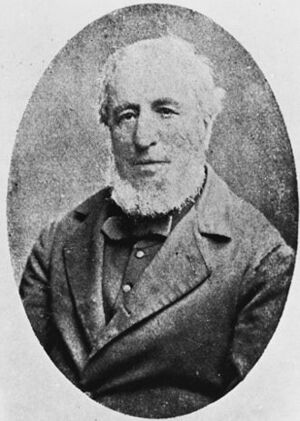Edward Davy (nonfiction)
Edward Davy (16 June 1806 – 26 January 1885) was an English physician, scientist, and inventor who played a prominent role in the development of telegraphy, and invented an electric relay.
Davy won the prize for botany in 1825, was licensed by the Worshipful Society of Apothecaries in 1828 and the Royal College of Surgeons in 1829. Soon after graduating, Davy began trading as an operative chemist under the name of Davy & Co. In 1836 he published a small book Experimental Guide to Chemistry, at the end of which was a catalogue of goods supplied by his firm.
Davy published Outline of a New Plan of Telegraphic Communication in 1836 and carried out telegraphic experiments the following year. He demonstrated the operation of the telegraph over a mile of wire in Regent's Park. In 1837 he demonstrated a working model of the telegraph in Exeter Hall. He was granted a patent for his telegraph in 1838.
However, he was soon obliged to drop his investigations of telegraphy for personal reasons. His patent was purchased by the Electric Telegraph Company in 1847 for £600.
Davey also invented an electric relay. He used a magnetic needle which dipped into a mercury contact when an electric current passed through the surrounding coil. In recognition of this he was elected in 1885 as an honorary member of the Society of Telegraph Engineers and was informed of this by telegraph shortly before his death.
In the News
Fiction cross-reference
Nonfiction cross-reference
External links
- Edward Davy @ Wikipedia
Social media
- Nonfiction (nonfiction)
- June (nonfiction)
- June 16 (nonfiction)
- 1800s (nonfiction)
- 1806 (nonfiction)
- January (nonfiction)
- January 26 (nonfiction)
- 1880s (nonfiction)
- 1885 (nonfiction)
- Edward Davy (nonfiction)
- Inventors (nonfiction)
- Mathematicians (nonfiction)
- People (nonfiction)
- Physicians (nonfiction)
- Scientists (nonfiction)
